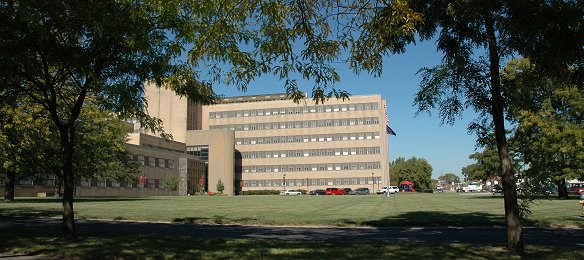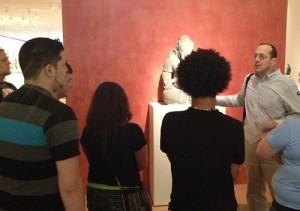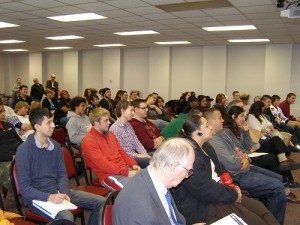Calumet College – In the Shadows of BP
July 20, 2012At Calumet College of St. Joseph in northwest Indiana, a student’s encounter with great works in the humanities is central to general education for all.

In the Shadows of BP: Teaching Humanities to Underprepared Students
By Chris Buczinsky and Ginger Rodriguez
How do you teach the humanities to working class students in the shadow of a BP oil refinery? Calumet College of St. Joseph (CCSJ), a small commuter college in northwest Indiana, is taking on the rather large task of figuring out the answer to that question.
Encountering the Humanities
Students entering college from chronically underperforming schools and from working class families without a tradition of higher education present unique challenges. CCSJ meets that challenge by placing the humanistic Western tradition at the center of its general education requirements. Entering freshman are enrolled in a traditional course in the Foundations of Western Culture, which introduces the arc of Western cultural history and the disciplines that make up the traditional humanities.
At the heart of the Foundations class, professors place the student’s encounter with a great humanistic work, focusing on reception and response, the two indispensable sides of the learning experience. The CCSJ program believes that students must first be turned on to thinking about life’s big questions through such an encounter. Freshman are immediately thrown into the challenge of looking at a Rembrandt etching, listening to the first movement of Mozart’s 40th, and reading a text by Dickens, Marcus Aurelius, or Augustine. Freshmen respond to their personal and class encounters in oral presentations and essays, but to assure student success, the humanities program at CCSJ builds a unique structure around that in-class encounter.
A General Education Sequence

The first element of that structure is a required, general education sequence. CCSJ’s general education program is not a cafeteria approach in which students can choose from a variety of different courses in a smorgasbord of disciplines. The Foundations course gets students thinking about life’s big issues and introduces them to some of the key conceptual terms and analytical methods of humanities disciplines. The program then traces the arc of history and uses those disciplinary methods across other required humanities classes: social justice, literature, history, philosophy, religious studies, and fine arts.
Moreover, this content is incorporated into a unique course in the Logic of Science and in the college’s social studies courses as well. The whole program culminates in “The Search for Meaning,” a capstone (or finishing) course, taken in the first semester of the junior year, that brings together the humanistic ideas introduced in the core curriculum. The capstone gives students the chance to synthesize all they have learned in their general education courses since taking their first course in the Foundations of Western Culture.
The Learning Community Model

The structure of the general education program provides a framework for introducing the humanities, but CCSJ’s learning community model breathes life into the program. The beating heart of the humanities lies in the encounter between the student and a single great humanistic work, and CCSJ’s learning communities help concentrate resources on facilitating that experience. Freshmen are placed in cohorts that share three general education classes: the Foundations of Western Culture, English Composition, and Social Justice. Monthly socials bond these commuter students into a real community, but this social structure is given intellectual substance, transforming students into a community of learners, in the link between the humanities courses and skills-based classes.
Individual instructors in these linked classes create, monitor, and grade shared assignments, an approach that dramatically increases the mutual benefits of teaching the humanities with basic skills and promises important results. This is not an easy process. Developing curricular links across general education and between faculty members with different approaches poses a host of challenges, and the appropriate administrative structure, with time for faculty members to meet and appropriate instructor evaluation procedures, becomes a necessity.
The Results
 CCSJ’s approach promotes the humanities without apology, without trying to hide their value under utilitarian justifications, and two years after making the humanities central to general education at Calumet College of St. Joseph, the approach seems to be working. Professors are seeing measurable results that include an improved basic knowledge of the Western tradition, a better understanding of the interrelationship of academic disciplines, and more student engagement by anchoring the teaching of basic reading and writing skills in debates about ideas that matter. CCSJ’s alumni tend to remain in northwest Indiana and take leadership positions in business, education, and public safety. The humanistic perspective they encounter during college may therefore have long-term effects that the measurable impact of Calumet College’s general education program cannot yet reveal.
CCSJ’s approach promotes the humanities without apology, without trying to hide their value under utilitarian justifications, and two years after making the humanities central to general education at Calumet College of St. Joseph, the approach seems to be working. Professors are seeing measurable results that include an improved basic knowledge of the Western tradition, a better understanding of the interrelationship of academic disciplines, and more student engagement by anchoring the teaching of basic reading and writing skills in debates about ideas that matter. CCSJ’s alumni tend to remain in northwest Indiana and take leadership positions in business, education, and public safety. The humanistic perspective they encounter during college may therefore have long-term effects that the measurable impact of Calumet College’s general education program cannot yet reveal.
Christopher Buczinsky, Ph.D., is an associate professor and the director of English at CCSJ. Ginger G. Rodriguez, Ph.D., is an assistant professor of English at CCSJ. We thank them for their assistance with this Spotlight and thanks also to Linda Gajewski, Director of Marketing and Public Relations.


